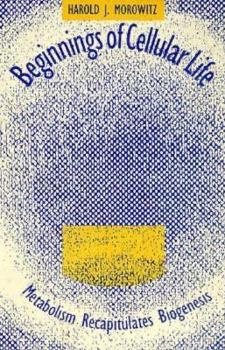Beginnings of Cellular Life: Metabolism Recapitulates Biogenesis
Select Format
Select Condition 
Book Overview
"This book is an extraordinary integration of a lifetime of thought on the subject by an exceptional scholar. Morowitz logically, consistently, and persuasively moves to define arguments that will... This description may be from another edition of this product.
Format:Hardcover
Language:English
ISBN:0300054831
ISBN13:9780300054835
Release Date:December 1992
Publisher:Yale University Press
Length:195 Pages
Weight:0.80 lbs.
Dimensions:0.9" x 5.8" x 8.6"
Customer Reviews
1 rating
Abiogenesis as basic physical chemistry
Published by Thriftbooks.com User , 17 years ago
Popular hypotheses on the origin of life generally surround the priming by hereditary material, by partitioning by micelles, or by early metabolic cycling. In Beginnings of Cellular Life, Harold Morowitz argues a sort of combination between the latter two, connecting the physical chemistries of carbon fixation, properties of C, O, H, N, P, and S, and extremely specific array of small ( To be sure, this book presents just a hypothesis. It is also probably over the heads of the average layperson. But his "principle of continuity" is the sound logic that any serious discussion on the origin of life must stick to, dismissing even Jacques Monod's vision of the origin of life as an event that has happened in the past and is truly unique, such that it cannot be recreated in the lab (Chance and Necessity, 1971). Simply put, the origin of life is at least conceptually accessible to science, and therefore any relevant hypothesis must be falsifiable (or conversely, verifiable). And as far as scientifically-argued explanations for the origin of life go, Morowitz has raised the bar, and having read the book, I'm surprised that this book has not gotten more publicity.





